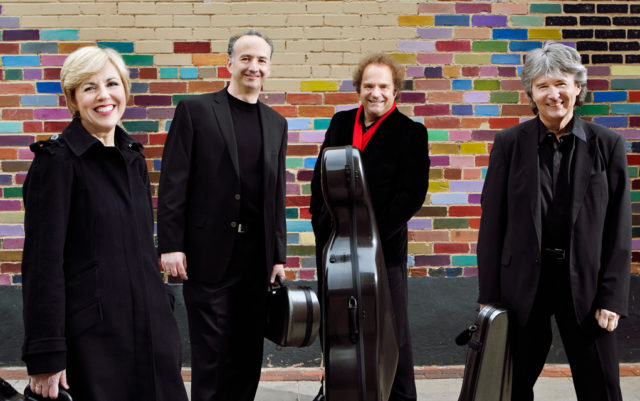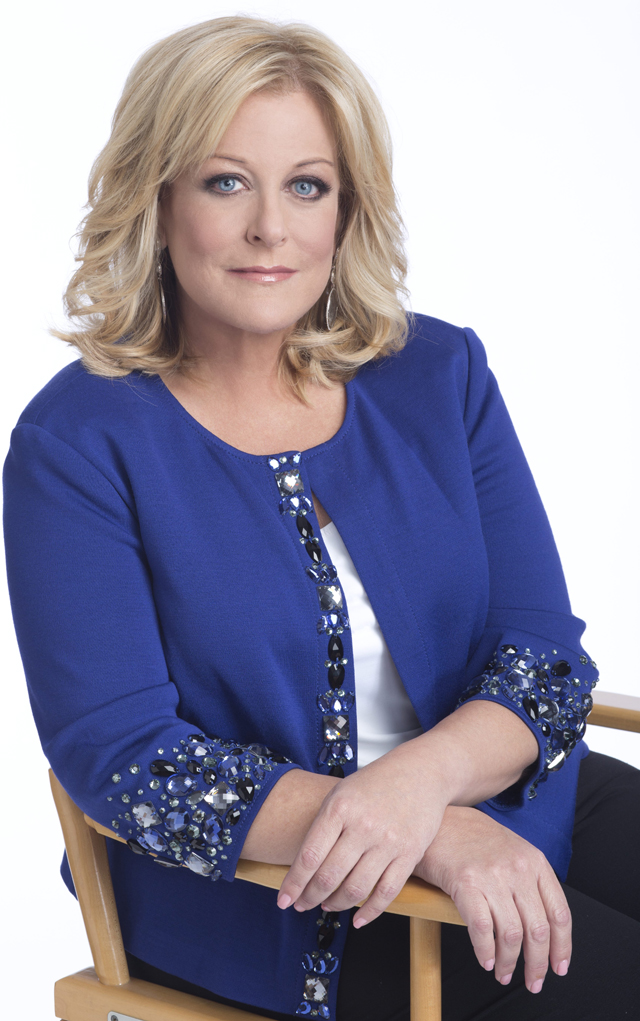
It will be a week of superstars in Boulder.
First will be famed Wagnerian soprano Deborah Voigt, presenting her one-woman show Voigt Lessons at Macky Auditorium on Saturday. Then the University of Colorado Boulder’s own superstars, the Takács String Quartet, begin a spring series of concerts in Grusin Hall with some of the stars from the CU Boulder music faculty Sunday and Monday. And next Wednesday, Feb. 22, Yo-Yo Ma presents a concert in Macky that, alas for latecomers, has been sold out for months.
Voigt’s one-woman show was written for her by Terrence McNally, the Tony-, Obie- and Emmy-award winning playwright, screenwriter and librettist for musicals and operas. A brutally honest retelling of her struggles during her career, the show is, Voigt says, “very much a story about a Midwest girl who turns out to be an international opera diva.”
The script includes songs that are especially meaningful to Voigt — most of them not operatic or art songs. “When people come to the theater, they’re not given a list of songs,” she says. “I want them to be surprised.”
She does reveal that she opens with a Carpenters song, “because I was a huge Karen Carpenter fan, and that’s the music I listened to. There is an art song and a definite nod to opera, of course.”
If you don’t know Voigt’s story, you might remember the “little black dress.”
In 2004, Voigt was removed from the cast of Richard Strauss’ Ariadne auf Naxos at London’s Royal Opera House because she could not fit into the costume — the “little black dress” — that the casting director wanted her to wear. Although Voigt did not comment for several months, the story eventually leaked out and became a flash point in battles about female opera singers’ appearance and weight.

Voigt herself has been open about her struggles with weight. After the black dress incident, she had successful gastric bypass surgery and lost more than 100 pounds, which she has discussed publicly. In fact, she wrote frankly about all of her struggles in her 2015 book Call Me Debbie: True Confessions of a Down-To-Earth Diva.
The idea for the one-woman show came from Francesca Zambello, Voigt’s friend and an operatic stage director. Voigt was surprised when McNally quickly accepted Zambello’s suggestion that he write the script.
“I had been keeping a list of random songs that I happened to like, and I shared that list with Terrence,” she says. “We sat down and talked, and he was able to work these songs into a narrative about my growing up in the Midwest and becoming an opera singer.”
Both the book and the show are remarkably frank about Voigt’s problems with weight, addictions and relationships. “I just wanted to be honest about everything that had happened,” she says.
“It became a matter of deciding I couldn’t tell this part of the story without telling that part. I knew my family would understand, [because] they were always supportive, and I knew that it would help people who struggle with the same issues.”
Today, Voigt is mostly retired from the operatic stage, teaching at the San Francisco Conservatory. “I’ve come to the point in my life where I don’t want to put myself through that any more,” she says of performing around the world. “I’m tired of the constant travel.”
She does travel for Voigt Lessons, as a way of reaching people who might not otherwise think much about opera. She’s pretty sure everyone will enjoy the show. “It’s going to be an entertaining evening,” she says. “There are some laughs, maybe a couple of funny expletives, there’s some drama. It’s a very intimate show.”
• • • •
The Takács Quartet opens its spring series of six concerts performing with percussionist Douglas Walter and clarinetist Daniel Silver, both CU faculty members, Sunday and Monday Feb. 19 and 20. The concert will open with Beethoven’s String Quartet in G major, op. 18 no. 2. Walter will play Michael Colgrass’ Variations for Four Drums and Viola with Takács member Geraldine Walther, and Silver will join the full quartet for Brahms’ Clarinet Quintet in B minor, op. 115.
That pattern of that program — guests from the CU faculty and one Beethoven quartet — will continue in the other concerts this spring. “We are so grateful to have so many talented artists and wonderful people to collaborate with on the music faculty,” Ed Dusinberre, the quartet’s first violinist, says. “This year we decided we would, more than usual, make them a feature of our programming.”
The collaboration with CU faculty is important to the quartet, because it gives them opportunities to perform music that otherwise is difficult for them to put together. “We decided to feature pieces here (in Boulder) that we wouldn’t so easily be able to do on the road,” Dusinberre says.
“When we’re on the road, there’s not a lot of time to rehearse. Those (pieces with CU music faculty) are the sorts of pieces that we wouldn’t typically get together on the road.”
Dusinberre also notes that Boulder audiences are as important as the quartet’s CU colleagues. “I think audiences sometimes don’t realize how important they are,” he says. “Just the way an audience listens to a piece of music affects [the players]. In a sense, an audience creates a performance.”
The Beethoven quartets on the concerts form a small sample of the full cycle of the composer’s 16 quartets that the Takács are playing at Wigmore Hall in London and various places in the U.S. As associate artists of the Wigmore, they were invited to perform the full cycle during the current season.
“If you commit to doing a Beethoven cycle, that’s a huge investment of time and energy, and you don’t want to just do it once,” Dusinberre says. “So we offered it in the states, but we decided in Boulder that we would try to feature some of the Beethoven quartets that we haven’t played quite so frequently here, rather than doing the whole cycle.”
The Beethoven performances also tie in to Dusinberre’s recently published book, Beethoven for a Later Age: Living with the String Quartets. A personal recollection of Dusinberre’s experiences with the quartets written for the general public, the book provides remarkable insights into the lives of professional quartet players. Takács Quartet fans should all take a read of it sometime during the spring series.
The upcoming concerts March 19 and 20 will feature Beethoven’s final String Quartet in F major, op. 135, and Haydn’s String Quartet in F major, op. 77 no. 2. Walther and guests Abigail Nims, alto, and Margaret McDonald, piano, will perform Two Songs for Alto, Viola and Piano by Brahms.
And on April 30 and May 1 the quartet will play Beethoven’s String Quartet in B-flat major, op. 18 no. 6. Soprano Jennifer Bird will perform Chausson’s Chanson perpétuelle with the full quartet and Alexandra Nguyen will perform Clara Schumann’s Three Romances, op. 21, with Dusinberre. That program and the spring concert series will conclude with Schubert’s much-loved “Trout” Quintet, with David Korevaar, piano, and Paul Erhard, double bass.
All the programs are presented in pairs at 4 p.m. Sundays and 7:30 p.m. Mondays in Grusin Music Hall on the CU campus. While most performances eventually sell out, there are often tickets available for on-stage seating and the Monday performances.
On the Bill: On the Bill: Voigt Lessons — Deborah Voigt, soprano. 7:30 p.m. Saturday, Feb. 18, Macky Auditorium, 1595 Pleasant St., Boulder. Takács Quartet. 4 p.m. Sunday, Feb. 19, 7:30 p.m. Monday, Feb. 20, Grusin Music Hall, CU Imig Music Building, 1020 18th St., Boulder. Yo-Yo Ma. SOLD OUT. 7:30 p.m. Wednesday, Feb. 22, Macky Auditorium, 1595 Pleasant St., Boulder. Tickets to all performances available at 303-492-8008, tickets.cupresents.org.














